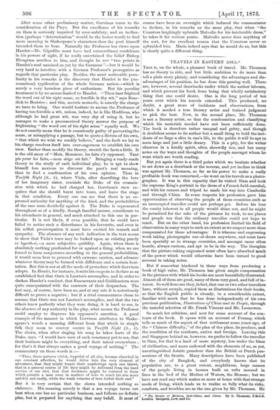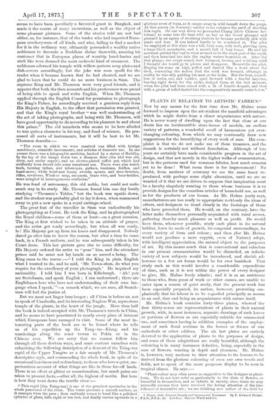TRAVELS IN EASTERN ASIA.*
Tins is, on the whole, a pleasant book of traveL Mr. Thomsop has no theory to ride, and but little ambition to do more than tell a plain story plainly, and considering the advantages and dis- advantages of his position, he has done this passing well. There are, however, several drawbacks under which the author labours, and which prevent his book from being that wholly satisfactory- thing that one could desire. One is the long period of ten years over which his travels extended. This produced, no doubt, a great store of incidents and observations, from which it needed a true literary artist and trained judgment to pick the best. Now, in the second place, Mr. Thomson is not a literary artist, so that the condensation and classifying- which his materials needed have not been sufficiently done,- The book is therefore rather unequal and gritty, and though it doubtless seems to its author but a small thing to hold the inci- dents of so rarge a slice in one's life, to the public it will be apt to. seem large and just a little dreary. This is a pity, for the writer observes in a kindly spirit, often shrewdly too, and has many notes on the ways and thoughts of the people amongst whom he went which are worth reading.
But yet again there is a third point which we hesitate whether- to set down as a drawback or the reverse, and yet incline to think was against Mr. Thomson, so far as his power to make a really- profitable book was concerned,—he went on his travels as a photo,. grapher. It was in this capacity that he visited Siam and took the supreme King's portrait in the dress of a French field-marshal, and with his camera and tripod he made his way into Cambodia and through China. In some respects his profession gave him opportunities of observing the people of these countries such sis. an unoccupied traveller could not perhaps get. Before his lens the vanity inherent in all people would shine out, and he might be permitted for the sake of the pictures he took, to see places and people too that the ordinary traveller could not hope to reach. But on the other hand, his profession limited his field of observation in many ways to such an extent as we suspect more than compensated for these advantages.' It is irksome and engrossing work taking photographs out-of-doors anywhere, and must have been specially so in strange countries, and amongst races often hostile, always curious, and apt to be in the way. The thoughts that the picture-taking engrossed must often have absorbed much of the power which would otherwise have been turned to good account in taking notes.
But if somewhat hindered in these ways from producing a book of high value, Mr. Thomson has given ample compensation in the pictures with which his books are most beautifully illustrated. Almost all of them are good, many of them very good, and full of in- terest. So well done are they, in fact, that one or two other travellers have, without scruple, copied them as illustrations for their books, so that the English public is already, to a considerable extent, familiar with much that he has done independently of his own previous publication, Illustrations of China and its People, through the tasteful selection of Mr. Frank Vincent and Mr. Leonowen.
So much for criticism, and now for some account of the con- tents of the book. It opens with an account of Penang, which tells us much of the aspect of that settlement some years ago, of the "Chinese difficulty," of the plan of the place, its produce, and the condition of the residents, native and foreign. Leaving this and Singapore behind us, however, we prefer to follow the traveller to Siam, for that is a land of more mystery, less under the blaze of civilisation, and more endowed with the elements of an, as yet, unextinguished Asiatic grandeur than the British or Dutch pos- sessions of the Straits. Many descriptions have been published of the city of Bangkok, and everybody knows that its population are, to a great extent, amphibious, large masses of the people living in houses built on rafts moored in lines in the bed of the Mother of Waters, the Menam ; but we have not read any which makes us more at home with that strange mode of living, which leads us to realise so fully what its risks, comforts, and troubles are as the one given by Mr. Thomson. He
• The Strai1s of Malacca, Indo-China, and Mina. By S. Thomson, London Sampson, Low, and Co.
seems to have been peculiarly a favoured guest in Bangkok, and made it the centre of many excursions, as well as the object of some pleasant pictures. Some of the stories told are not bad either, as, for instance, that of the trader who had imported Euro- pean crockeryware of all kinds, and who, failing to find a market for it in the ordinary way, ultimately persuaded a wealthy native nobleman to decorate a Buddhist shrine therewith, assuring his customer that in European places of worship hand-basins and such like were deemed the most recherche kind of ornament. The nobleman adorned his temple with willow-pattern soup plates and dish-covers accordingly-, but the joke was soon spoilt for the trader when it became known that he had cheated, and we are glad to learn that he could do no more business in Siam. The supreme King and Mr. Thomson were very good friends, and it appears that both the then monarch and his predecessor were proud of being able to speak and write English. When Mr. Thomson applied through the English Consul for permission to photograph the King's Palace, he accordingly received a gracious reply from The Majesty in English, to the effect that permission was granted, -and that the King's royal brother "was well understanding of the art of taking photographs, and being with Mr. Thomson, will have good opportunity to do accordingto his pleasure in and about this palace." The old mandarin who seems to be here alluded to was quite a character in his way, and fond of science. He pos- sessed all sorts of instruments, but it will be best to let Mr. Thomson describe :—
" The room in which we were received was filled with foreign machinery, scientific instrnments, and articles of domestic use. In one corner there was a telegraphic machine, backed by a statue of Buddha. In the lap of the imago there was a Siamese flute (the idol was old, dirty, and under repair). and an electro-plated coffee pot, which had evidently been forced into some unnatural use. There were also watch tools, taming lathes, and telescopes, guitars, tomtoms, fiddles, and hand-saws ; while betel-nut boxes, swords, spears, and shoe-brushes, rifles, revolvers, Windsor soap, rat-paste, brass wire, and beer-bottles, were mingled in heterogeneous confusion."
He was fond of astronomy, this old noble, but could not make much Way in its stady. Mr. Thomson found him one day busily Studying "Thomson's Tables," but the book was upside down, and the sttident was probably glad to lay it down, when summoned away to put a new spoke in a royal carriage-wheel.
The great feat of the traveller in Siam was undoubtedly his photographing at Court. He took the King, and he photographed the Royal children—some of them at least—on a great occasion.
The King at first wished to be taken in an attitude of prayer, and the artist got ready accordingly, but when all was ready, lo ! His Majesty got up from his knees and disappeared. Nobody dared go after him to know the reason, but after a time he came back, in a French uniform, and he was subsequently taken in his Court dress. This last picture gave rise to some difficulty, for His Majesty ordered the artist to "pose" him, and the attendant prince said he must not lay hands on so sacred a being. The King came to the rescue :—" I told the King in plain English what I wanted to do, and he said, 'Mr. Town-shun, do what you require for the excellency of your photograph.' He inquired my nationality. I told him I was born in Edinburgh. ' you are Scotchman, and speak English ; I can understand ; there are Englishmen here who have not understanding of their own lan- guage when I speak,' "—a remark which, we are sure, all Scotch- men will feel the justice of.
But we must not linger here longer ; all China is before us, not to speak of Cambodia, and its interesting Nagkon Wat, mysterious temple of the giants, in the heart of the jungle. More than half the book is indeed occupied with Mr. Thomson's travels in China, and he seems to have penetrated to nearly every place of interest , which Europeans have managed to visit. Some of the most in- teresting parts of the book are to be found where he tells us of his expedition up the Yang- tse -Kiang, and his wanderings along the coast towns to Pekin or in the Chinese seas. We are sorry that we cannot follow him through all these devious ways, and must content ourselves with submitting the following description of a descent of the Tsing-tau rapid of the Upper Yangtse as a fair sample of Mr. Thomson's descriptive style, and commending the whole book, in spite of its occasional heaviness and redundancy, to those who love a quiet, un- pretentious account of what things are like in those far-off lands.
There is no effort at glitter or sensationalism, but much pains are taken to present facts,—after all, the highest of merits. But here is how they went down the terrific river :—
"This rapid [the Tsing-tan] is one of the grandest spectacles in the whole panorama of the river. The water presents a smooth surface, as it emerges from the pass ; then suddenly seems to bend like a polished cylinder of glass, falls eight or ten feet, and finally curves upwards in a glorious crest of foam, as it surges away in wild tumult down the gorge. At this season (in January) sundry rocks enhance the peril of shooting this rapid. On our way down we persuaded Chang [their Chinese fac- totum] to come into the boat with us, but as the vessel plunged and groaned in an agony of straining timbers he became perfectly sick with panic and fear. It was indeed hardly to be wondered at. The pilot we employed at this time was a tall, bony man, with dark, piercing eyes, a huge black moustache, and a mouth full of foxy fangs. Ilo and his assistant guided the boat to what seemed to be the worst part of the rapid, and then launched her into the raging waters broadside on. After the first plunge, she swept round, bow foremost, tossing and writhing until I thought she would go to pieces and disappear. Meanwhile the pilot, flinging his arms on high, yelled and danced like a fiend about the deck, conveying the notion that the craft was doomed, although in reality be was only guiding his men at the helm. But the boat, regard- less of oaths, oar, and rudder, sped forward with a fearful impetus, bearing right down for the rocks, dodged them at the last moment, when the pilot had been seized with a fit of frantic despair, and then with a groan of relief darted into the comparatively smooth water below."



































 Previous page
Previous page